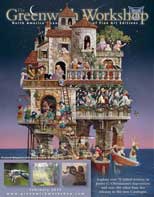
LeRoy Neiman's work is instantly recognizable- it pops with loads of bright colors washed across the canvas in a manner that walks the line between impressionist and expressionist. However, he didn't always paint in this way. Born LeRoy Runquist in St. Paul, Minnesota in 1921, he took his first stepfather's surname of Neiman after his biological father abandoned the family. He played on the streets of St. Paul and used his artistic talent to make friends, charm teachers, and earn money. Neiman would give his schoolmates ink tattoos on the playground and drew chalk paintings of grocers and their produce for money. Neiman then dropped out of school to join the army as a cook. There, he painted suggestive scenes on the mess hall walls and designed sets for Red Cross plays. His pieces were appreciated by the men, and it gave him all the encouragement he needed to attend the St. Paul School of Art and the School of the Art Institute of Chicago on the GI Bill after his return from World War II.
Upon graduation, LeRoy Neiman began a ten year teaching stint at the Art Institute of Chicago. One day, the handyman at a neighboring apartment was discarding half used tins of house paint, which Neiman scooped up to test out as a new medium. It turned out that the free flowing enamel was well suited to quick brushstrokes and thus his characteristic style was born. During his tenure as a teacher, he also did freelance work and entered his pieces in competitions. One freelance project with Carson Pirie Scott proved to be particularly lucrative- he met both his future wife and Hugh Hefner there. In 1954, Hefner and the Playboy Magazine's art director commissioned Neiman to illustrate a piece for a story. This soon led to Neiman's creation of the Femlin character for the Party Jokes column, followed by the monthly "Man at His Leisure” feature, which highlighted the painter's take on travels to far flung locations for exotic events like the Grand Prix, Cannes Film Festival, and the running of the bulls in Pamplona.
However, Neiman's interests ranged beyond the playgrounds of the rich and the famous. He loved sports and athletes and created his interpretations of five Olympiads, several Super Bowls, and countless horse races, boxing matches, tennis rounds, golf shots, sailing regattas, and ballgames. Neiman also had a passion for animals. He went on several safaris and from that inspiration created such iconic pieces as "Portrait of the Elephant”, "Resting Lion”, and "The Big Five”.
Neiman enjoyed the admiration of many. Over the course of his career, he had solo exhibitions at more than fifty venues around the world, dozens of group shows, and even a dual show with Andy Warhol. Highly-regarded museums around the world hold his pieces as part of their permanent collections sales of his serigraphs are annually in the tens of millions. However, critics have almost universally panned his work. Many consider it to be gaudy, garish, or commercial. Neiman admitted that at times, this negative reception bothered him, but that whenever he returned to his canvas he felt at home and was reminded of his passion.
New York City was home for Neiman and his wife Janet for nearly half a century. He lived and worked out of an apartment with double-height rooms overlooking Central Park. LeRoy Neiman passed away on June 20, 2012 at the age of 91. Over the course of his career, he published ten books, sold more than 200,000 prints, received four honorary degrees, and collected numerous merit awards. His sizable contributions made possible the LeRoy Neiman Center for Print Studies at Columbia University and the Art Horizons LeRoy Neiman Art Center. His archives will be preserved by the Smithsonian Institution.





